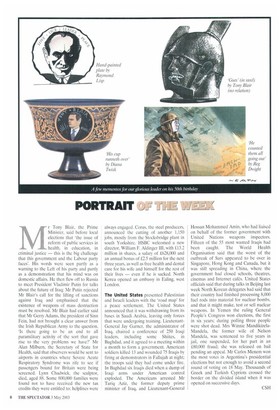1 . Tony Blair, the Prime Minister, said before local elections that 'the issue of reform of public services in
_ health, in education, in criminal justice — this is the big challenge that this government and the Labour party faces'. His words were seen partly as a warning to the Left of his party and partly as a demonstration that his mind was on domestic affairs. He then flew off to Russia to meet President Vladimir Putin for talks about the future of Iraq: Mr Putin rejected Mr Blair's call for the lifting of sanctions against Iraq and emphasised that the existence of weapons of mass destruction must be resolved. Mr Blair had earlier said that Mr Gerry Adams, the president of Sinn Fein. had not brought a clear answer from the Irish Republican Army to the question, 'Is there going to be an end to all paramilitary activity of the sort that gave rise to the very problems we have?' Mr Alan Milburn, the Secretary of State for Health, said that observers would be sent to airports in countries where Severe Acute Respiratory Syndrome was rife to see if passengers bound for Britain were being screened. Lynn Chadwick, the sculptor, died, aged 88. Some 800,000 families were found not to have received the new tax credits they were entitled to; helplines were always engaged. Carus, the steel producers, announced the cutting of another 1,150 jobs, mostly from the Stocksbridge plant in south Yorkshire. HSBC welcomed a new director, William F. Aldinger III, with £13.2 million in shares, a salary of £628,000 and an annual bonus of £2.5 million for the next three years, as well as free health and dental care for his wife and himself for the rest of their lives — even if he is sacked. North Korea opened an embassy in Ealing, west London.
The United States presented Palestinian and Israeli leaders with the 'road map' for a peace settlement. The United States announced that it was withdrawing from its bases in Saudi Arabia, leaving only forces that were undergoing training. LieutenantGeneral Jay Garner, the administrator of Iraq, chaired a conference of 250 Iraqi leaders, including some Shiites, in Baghdad, and it agreed to a meeting within a month to form a government. American soldiers killed 13 and wounded 75 Iraqis by firing at demonstrators in Fallujah at night; the troops said they had come under fire. In Baghdad six Iraqis died when a dump of Iraqi arms under American control exploded. The Americans arrested Mr Tariq Aziz, the former deputy prime minister of Iraq, and Lieutenant-General
Hossan Mohammed Amin, who had liaised on behalf of the former government with United Nations weapons inspectors. Fifteen of the 55 most wanted Iraqis had been caught. The World Health Organisation said that the worst of the outbreak of Sars appeared to be over in Singapore, Hong Kong and Canada, but it was still spreading in China, where the government had closed schools, theatres, cinemas and Internet cafés. United States officials said that during talks in Beijing last week North Korean delegates had said that their country had finished processing 8,000 fuel rods into material for nuclear bombs, and that it might make, test or sell nuclear weapons. In Yemen the ruling General People's Congress won elections, the first in six years; during polling three people were shot dead. Mrs Winnie MandikizelaMandela, the former wife of Nelson Mandela, was sentenced to five years in jail, one suspended, for her part in an £80,000 fraud; she was released on bail pending an appeal. Mr Carlos Menem won the most votes in Argentina's presidential elections but not enough to avoid a second round of voting on 18 May. Thousands of Greek and Turkish Cypriots crossed the border on the divided island when it was opened on successive days.
CSH










































































 Previous page
Previous page